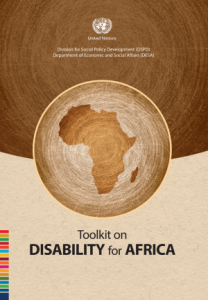- Main page: Handbook for Parliamentarians
- Joining the Convention
- Reservations to the Convention and Optional Protocol
- Declarations to the Convention and Optional Protocol
- Relevance of the Convention to non-parties
RESERVATIONS TO THE CONVENTION AND OPTIONAL PROTOCOL
A reservation is a statement that purports to exclude or modify the legal effect of a treaty provision with regard to the State or regional integration organization concerned. The statement might be entitled “reservation,” “declaration,” “understanding,” “interpretative declaration” or “interpretative statement.” However phrased or named, any statement that excludes or modifies the legal effect of a treaty provision is, in fact, a reservation. A reservation may enable a State or regional integration organization that would otherwise be unwilling or unable to participate in the Convention or Optional Protocol to so participate.
States or regional integration organizations may make reservations upon signing, ratification, formal confirmation or accession. When the reservation is made at the time of signing, the reservation is merely declaratory and must be formally confirmed in writing when the State expresses its consent to be bound.
States or regional integration organizations may also make reservations after ratification, formal confirmation or accession.
Normally, when a State or regional integration organization formulates a reservation, it must be included in the instrument of ratification, formal confirmation or accession, or be annexed to it and separately signed by the Head of State, Head of Government or Minister for Foreign Affairs, or a person having full powers for that purpose issued by one of the authorities just mentioned.
When the United Nations Secretary-General receives a reservation, the Secretary-General informs other States, usually by e-mail, on the date of formulation. When the Secretary-General receives a reservation after an instrument of ratification, formal confirmation or accession is deposited and it meets the formal requirements outlined below, the Secretary-General circulates the reservation to all States concerned.
RESERVATIONS THAT ARE NOT PERMISSIBLE
The Convention and the Optional Protocol both permit reservations. However, reservations incompatible with the object and purpose of the Convention or the Optional Protocol are not permitted.
OBJECTING TO RESERVATIONS
After a reservation is circulated, other States have 12 months in which they can object to the reservation, beginning on the date the notification of reservation was deposited or the date on which the State or regional integration organization expressed its consent to be bound by the treaty, whichever is later.
When a State lodges an objection to a reservation with the Secretary-General after the end of the 12-month period, the Secretary-General circulates it as a “communication.”
Modifying and withdrawing reservations
An existing reservation may be modified. Modification might result in a partial withdrawal of the reservation or might create new exemptions from, or modifications of, the legal effects of certain provisions. A modification of the latter kind is similar to a new reservation. The Secretary-General of the United Nations circulates these modifications and grants other States 12 months within which to object to them. In the absence of objections, the Secretary-General accepts the modification in deposit. If there is an objection, the modification fails.
A State or regional integration organization may withdraw any reservation it has made to the Convention or Optional Protocol at any time. The withdrawal must be formulated in writing and signed by the Head of State, Head of Government or Minister for Foreign Affairs, or a person having full powers for that purpose issued by one of those authorities. The United Nations Secretary-General circulates a notification of a withdrawal to all States concerned.
Next – Chapter Four: Declarations to the Convention and Optional Protocol




